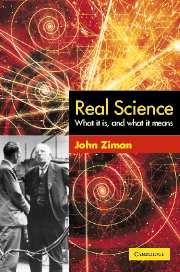Book contents
- Frontmatter
- Contents
- Preface
- 1 A peculiar institution
- 2 Basically, it's purely academic
- 3 Academic science
- 4 New modes of knowledge production
- 5 Community and communication
- 6 Universalism and unification
- 7 Disinterestedness and objectivity
- 8 Originality and novelty
- 9 Scepticism and the growth of knowledge
- 10 What, then, can we believe?
- Endnotes
- Bibliography and author index
- Index
9 - Scepticism and the growth of knowledge
Published online by Cambridge University Press: 24 August 2009
- Frontmatter
- Contents
- Preface
- 1 A peculiar institution
- 2 Basically, it's purely academic
- 3 Academic science
- 4 New modes of knowledge production
- 5 Community and communication
- 6 Universalism and unification
- 7 Disinterestedness and objectivity
- 8 Originality and novelty
- 9 Scepticism and the growth of knowledge
- 10 What, then, can we believe?
- Endnotes
- Bibliography and author index
- Index
Summary
The agonistic element
The final norm of academic science [3.7] is organized skepticism. This sounds like a philosophical doctrine, but is not a call for total doubt. The metaphysical notion that we cannot really know anything is not incompatible with being a scientist, but is so general and abstract that it has no more impact on scientific practice than it does on other aspects of life [8.10, 10.5]. Again, scepticism has psychological overtones, favouring a ‘questioning’ attitude, akin to ‘curiosity’ [2.7]. This attitude is as necessary to scientific progress as personal ‘creativity’, although it must not be confounded with a conservative stance that automatically rejects every new idea.
But its real force is sociological. ‘Scepticism’ is a code word for those features of the scientific culture that curb ‘originality’. Personal trust is an essential feature of scientific life [5.7]. But scientific communities do not accept research claims on the mere say-so of their authors. The active, systematic exercise of this norm by individual researchers is what, above all, makes science a communal enterprise. ‘Peer review’ is the key institution of the scientific culture.
We have already noted a number of the ways in which this norm indirectly shapes scientific knowledge. To be considered ‘scientific’, a ‘fact’ or theory has to satisfy a number of general epistemic criteria, such as reproducibility, logical consistency, independence of the observer, etc. These are essential conditions for communal acceptability.
- Type
- Chapter
- Information
- Real ScienceWhat it Is and What it Means, pp. 246 - 288Publisher: Cambridge University PressPrint publication year: 2000
- 1
- Cited by

